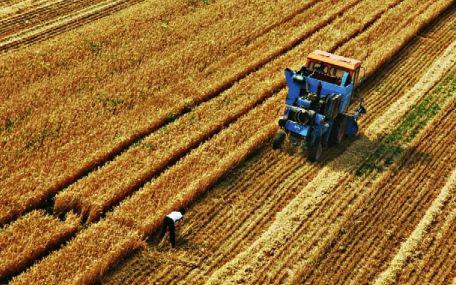Society
Self-sufficient Food Supply
Chinas recently released Food and Nutrition Development Outline 2014-2020 set the goal of securing the countrys annual grain output at above 550 million tons by 2020. According to Zhang Hui, an offi cial from the Ministry of Agriculture, China has long adhered to the principle of self-dependence in food supply, and gives top priority to feeding its 1.3 billion population. In fact China has no alternative to self-reliance, since international markets can provide only half of Chinas annual consumption, and domestic production is the only guarantee of the countrys food security. To date, grain imports constitute 2.5 percent of domestic output, well within the safe range for a self-feeding country. Last year China produced 602 million tons of grain, including 543 million tons of wheat, rice and corn.
China Has Positive Image in Global Survey
A new survey indicates that China enjoys a favorable image worldwide. The survey, conducted by the Charhar Institute, the Center for International Communication Studies of CIPG, and the Millward Brown-ACSR, found that China had the fi fth highest score among 11 countries. Over half of respondents said they are happy to associate with Chinese people. As many as 58 percent of respondents see China as a rising economic power, and 64 percent acknowledge the opportunities Chinas economic development opens to the world economy. Among the latter the rate soars to 72 percent in developing countries. Lenovo, Huawei and Air China were singled out as the three best known Chinese brands. The survey also indicates that the international community is generally optimistic about Chinas growth prospects, with nearly half of respondents expecting China to grow steadily.
RMB 156.6 Billion
China raised its subsistence allowance for the poor in 2013 to a total sum of RMB 156.6 billion. This includes subsidies of more than RMB 72.4 billion for the urban poor (up 13.9 percent from the previous year). Subsidies for the rural poor rose to RMB 84.2 billion, an increase of 17.3 percent. Benefits for seniors, people with disabilities and juveniles with no income in rural areas totaled RMB 17.4 billion.
Provisional Measures for Social Aid Promulgated
The State Council promulgated the Provisional Measures for Social Aid, which will take effect on May 1. This is the fi rst decree to cover all eight of Chinas social assistance programs – subsistence allowance, support for the extremely poor, disaster relief, medical aid, educational subsidies, housing subsidies, employment aid and temporary allowance. The basic content of the statute consists in the participation of societal forces. It outlines a complete, clearly defi ned system of social aid.
“Safe Havens” for Abandoned Babies
To date 28 Chinese provinces, autonomous regions and municipalities have built or are planning temporary shelters for abandoned babies. These facilities usually consist of an incubator, a delayed alarm device, an air conditioner and a child-size bed. When a baby is abandoned in the shelter, an alarm informs the welfare staff who then transfer the child to a hospital or an orphanage depending on its condition. The fi rst such shelter in China was set up in June 2011 in Shijiazhuang, capital of Hebei Province. Last July the Ministry of Civil Affairs instructed local governments to run trials of this program according to local conditions.
Activity
The Bach Choir – The Glory of Easter
Date: April 10, 2014
Place: Shanghai Oriental Art Center
Price: RMB 380/300/220/150/80
The Bach Choir was founded in 1876 in the U.K. From the first performance in Britain of Bachs Mass in B Minor to the soundtrack for Ridley Scotts epic Prometheus, its musical heritage is as rich as it is diverse. David Hill became the choirs ninth musical director in 1998. He is also chief conductor of the BBC Singers and associate guest conductor of the Bournemouth Symphony Orchestra. Delius A Mass of Life performed by the Bach Choir won Choc de Classica in 2012. The choir has also contributed to the film soundtracks of Kingdom of Heaven, The Chronicles of Narnia and Robin Hood.
NCPA Production La Traviata
Date: April 10-12, 2014
Place: National Center for the Performing Arts
Price: RMB 880/680/600/550/450/280/100
La Traviata is the last part of The Popular Trilogy by Verdi, the Italian romanticist composer. It is one of the most celebrated classical works in world opera history and was also the first Western opera performed in the Peoples Republic of China.
The story originates in the novel Lady of the Camellias by Alexandre Dumas, fils. The NCPA production stage setting includes a 264-square-meter mirror and flowing lights and shadows, which present a stunning visual feast.

